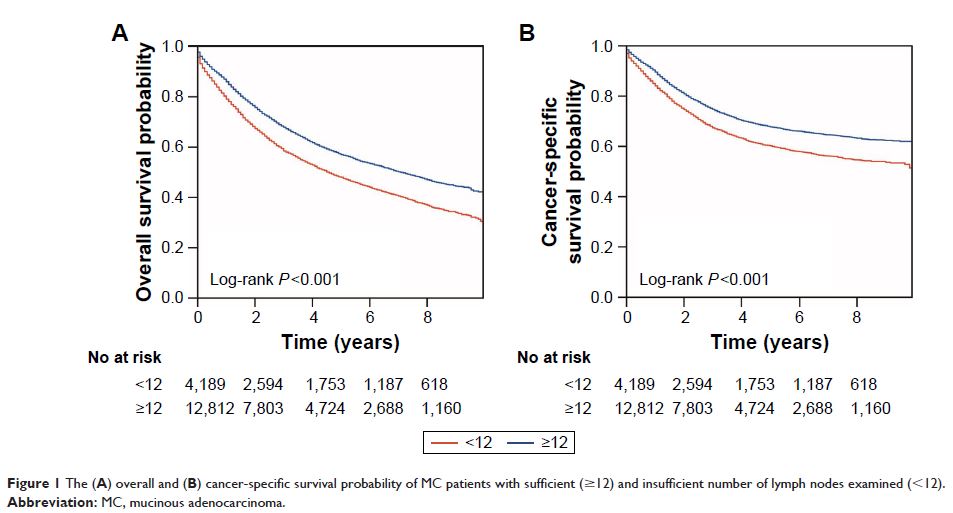9 0 6 7 6
论文已发表
注册即可获取德孚的最新动态
IF 收录期刊
- 2.6 Breast Cancer (Dove Med Press)
- 3.9 Clin Epidemiol
- 3.3 Cancer Manag Res
- 3.9 Infect Drug Resist
- 3.6 Clin Interv Aging
- 4.8 Drug Des Dev Ther
- 2.8 Int J Chronic Obstr
- 8.0 Int J Nanomed
- 2.3 Int J Women's Health
- 3.2 Neuropsych Dis Treat
- 4.0 OncoTargets Ther
- 2.2 Patient Prefer Adher
- 2.8 Ther Clin Risk Manag
- 2.7 J Pain Res
- 3.3 Diabet Metab Synd Ob
- 4.3 Psychol Res Behav Ma
- 3.4 Nat Sci Sleep
- 1.9 Pharmgenomics Pers Med
- 3.5 Risk Manag Healthc Policy
- 4.5 J Inflamm Res
- 2.3 Int J Gen Med
- 4.1 J Hepatocell Carcinoma
- 3.2 J Asthma Allergy
- 2.3 Clin Cosmet Investig Dermatol
- 3.3 J Multidiscip Healthc

在结直肠粘液腺癌的不同阶段所检查出的淋巴结数量对预后的影响
Authors Ma Y, Luo YQ, Lin N, Lv YZ, Zhou Y, Li B, Han KN, Jiang S, Gao JJ
Received 19 January 2018
Accepted for publication 25 April 2018
Published 25 June 2018 Volume 2018:11 Pages 3659—3670
DOI https://doi.org/10.2147/OTT.S163076
Checked for plagiarism Yes
Review by Single-blind
Peer reviewers approved by Dr Amy Norman
Peer reviewer comments 3
Editor who approved publication: Dr Carlos E Vigil
Background: Mucinous adenocarcinoma (MC) is a special kind of colorectal adenocarcinoma
that occurs more frequently in young patients and females, but the prognostic
effect of lymph nodes in MC patients is unclear. This population-based study
was conducted to analyze the prognostic value of the number of lymph nodes
examined in different stages of colorectal MC.
Methods: We included 17,001 MC patients from the Surveillance,
Epidemiology, and End Results program database between 2003 and 2013, of which
12,812 (75%) had >12 lymph nodes examined.
Results: Compared to the group with insufficient lymph nodes examined, patients
with more lymph nodes (>12) examined tended to come from east and central
America, were more frequently female and young, were diagnosed after 2008, had
larger-sized tumors of less differentiated grade and in later stages, had not
received radiation therapy and had more positive nodal status. Patients with
more lymph nodes (>12) examined demonstrated significantly better survival
than those with insufficient lymph nodes examined only in stages II and III (stage
II: overall, P <0.001; cancer-specific, P <0.001; stage III:
overall, P =0.093; cancer-specific, P =0.032), even though the overall
(P <0.001) and cancer-specific
survival (P <0.001) showed significant
differences between the two groups. Both univariate (overall, HR=0.739, 95%
CI=0.703–0.777, P <0.001;
cancer-specific, HR=0.742, 95% CI=0.698–0.788, P <0.001)
and multivariate (overall, HR=0.601, 95% CI=0.537–0.673, P <0.001; cancer-specific,
HR=0.582, 95% CI=0.511–0.664, P <0.001) Cox
proportional hazards models verified the association between >12 lymph nodes
examined and better survival.
Conclusion: More number of lymph nodes >12) examined significantly
increased the survival probability of MC patients in stages II and III, but had
no significant influence on patients in stages I and IV, indicating the effect
of number of lymph nodes examined was a stage-dependent prognostic factor in
clinical utility.
Keywords: number of lymph nodes examined, stages, mucinous carcinoma
